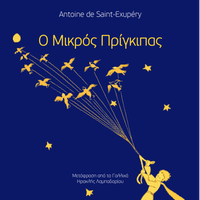11//
11//
11//
11//
Στον δεύτερο πλανήτη κατοικούσε ένας ματαιόδοξος.
|||||Eitelkeitsdöner
|||||vain
O segundo planeta era habitado por um homem vaidoso.
«Α!
A
Α!
Επίσκεψη από έναν θαυμαστή!» φώναξε από μακριά ο ματαιόδοξος μόλις είδε τον μικρό πρίγκιπα.
|||Bewunderer|||||eitel|||||
Visit|||fan|||||vain|||||
A visit from a fan! " cried the vanity from afar as soon as he saw the little prince.
A visita de um admirador!", gritou o vaidoso de longe, assim que viu o principezinho.
Καθώς, για τους ματαιόδοξους, όλοι οι υπόλοιποι άνθρωποι είναι θαυμαστές.
|||Eitelkeitsmenschen|||übrigen|||
|||vain||||||admirers
As for the vanities, all other people are admirers.
Quanto aos vaidosos, todas as outras pessoas são fãs.
«Καλημέρα» είπε ο μικρός πρίγκιπας.
Good morning||||
«Έχετε ένα παράξενο καπέλο».
|||chapeau
||strange|
"You have a strange hat."
«Vous avez un chapeau étrange».
"Tens um chapéu estranho."
«Είναι για να χαιρετάω» του απάντησε ο ματαιόδοξος.
|||||||vaniteux
|||grüßen||||Eitel
|||greet||||vain
"It's to say hello," the vanity replied.
«C'est pour saluer», répondit l'orgueilleux.
"É para cumprimentar", respondeu o homem vaidoso.
«Είναι για να χαιρετάω όταν με χειροκροτούν.
||||||applaudieren
|||to greet|||applaud
"It's to say hello when I'm applauded.
«C'est pour saluer quand on m'applaudit.»
"Trata-se de acenar quando me batem palmas.
Δυστυχώς, ποτέ δεν περνάει κανείς από εδώ».
|never||passes|||
Unfortunately, no one ever passes through here."
Malheureusement, personne ne passe jamais par ici».
Infelizmente, nunca ninguém passa por aqui".
«Α, ναι;» είπε ο μικρός πρίγκιπας που δεν καταλάβαινε.
||||little||||understood
"Oh yes;" said the little prince who did not understand.
"Ah, sim?", diz o principezinho que não percebe.
«Χτύπα τα χέρια σου, το ένα με το άλλο» τον συμβούλεψε ο ματαιόδοξος.
Schlag||||||||||||
clap||||||||||advised||vain
"Shake your hands, one with the other," advised the vanity.
"Bate palmas, uma com a outra", aconselhou o homem vaidoso.
Ο μικρός πρίγκιπας χτύπησε τα χέρια του, το ένα με το άλλο.
||prince|clapped||||||||
Ο ματαιόδοξος χαιρέτισε με ευγνωμοσύνη, σηκώνοντας το καπέλο του.
||grüßte||||||
||greeted||gratitude|lifting|||
The vainglorious saluted gratefully, tipping his hat.
O homem da vaidade saudou com gratidão, levantando o chapéu.
«Εδώ πέρα είναι πιο διασκεδαστικά από την επίσκεψη στον βασιλιά» σκέφτηκε ο μικρός πρίγκιπας.
|hier|||unterhaltsam|||||||||
||||fun|||||||||
"Here it is more fun than visiting the king," thought the little prince.
"Este sítio é mais divertido do que visitar o rei", pensou o principezinho.
Κι άρχισε πάλι να χτυπά τα χέρια του, το ένα με το άλλο.
||||clap||||||||
And he started clapping his hands again, one on top of the other.
E começou a bater de novo com as mãos, uma na outra.
Ο ματαιόδοξος άρχισε πάλι να χαιρετά σηκώνοντας το καπέλο του.
|||||grüßen||||
|||||greet||||
The vain man began again to greet by raising his hat.
O homem da vaidade começou a acenar de novo, levantando o chapéu.
Μετά από πέντε λεπτά εκγύμνασης, ο μικρός πρίγκιπας κουράστηκε από τη μονοτονία του παιχνιδιού: «Και, για να πέσει το καπέλο» ρώτησε, «τι πρέπει να κάνω;» Μα ο ματαιόδοξος δεν τον άκουσε.
|||||||||||||||||||||||||||vaniteux|||
||||Training||||hatte sich müde|||Monotonie||||||fallen||Hut||||||||eitle|||
||||exercise||||got tired|||||||||fall|||||||||||||
After five minutes of exercise, the little prince grew tired of the monotony of the game: 'And, for the hat to fall,' he asked, 'what should I do?' But the vain man did not hear him.
Após cinco minutos de treino, o principezinho estava cansado da monotonia do jogo: "E, para fazer cair o chapéu", perguntou, "o que é que tenho de fazer?
Οι ματαιόδοξοι δεν ακούν τίποτα άλλο πέρα από τις επευφημίες.
|Eitelkeiten||||||||Beifall
|vain||||||||applause
Vain people do not hear anything but applause.
Os vaidosos só ouvem aplausos.
Σ 11 42 «Στ' αλήθεια με θαυμάζεις τόσο πολύ;» ρώτησε τον μικρό πρίγκιπα.
||||bewunderst||||||
|St|||admire||||||
P 11 42 "Do you really admire me that much?" asked the little prince.
P 11 42 "Admiras-me assim tanto?", perguntou o principezinho.
«Τι σημαίνει θαυμάζω;» «Θαυμάζω σημαίνει πως αναγνωρίζεις ότι είμαι ο πιο όμορφος, ο πιο καλοντυμένος, ο πιο πλούσιος και ο πιο έξυπνος στον πλανήτη».
||||||||||||||bien habillé|||||||||
||bewundern||||erkennst||||||||gut gekleidet|||||||||
||I admire|I admire|||||||||||well-dressed|||||||||
What does it mean to admire? To admire means that you recognize that I am the most beautiful, the best dressed, the richest, and the smartest on the planet.
"O que significa admirar?" "Admirar significa que reconheces que sou a pessoa mais bonita, mais bem vestida, mais rica e mais inteligente do planeta."
«Μα είσαι μόνος σου στον πλανήτη σου!» «Κάνε μου αυτή τη χάρη.
|||||||do||||favor
But you are all alone on your planet! Do me this favor.
"Mas vocês estão sozinhos no vosso planeta!" "Façam-me este favor.
Θαύμασέ με ούτως ή άλλως!» «Θα σε θαυμάζω» είπε ο μικρός πρίγκιπας ανασηκώνοντας τους ώμους «αλλά γιατί σ' ενδιαφέρει τόσο πολύ αυτό;» Κι ο μικρός πρίγκιπας έφυγε.
bewundere||so||anders||||||||hebt||||||||||||||
admire||||otherwise||||||||lifting||shoulders||||||||||||
Admire me anyway! I will admire you, said the little prince, shrugging his shoulders, but why does it matter to you so much? And the little prince left.
Admira-me na mesma!" "Vou admirar-te", disse o principezinho, encolhendo os ombros, "mas porque é que te preocupas tanto com isso?" E o principezinho foi-se embora.
“Οι ενήλικες είναι σίγουρα αρκετά παράξενοι”, σκέφτηκε κατά τη διάρκεια του ταξιδιού του.
|||surely||strange|||||||
"Adults sure are pretty weird," he thought during his trip.
"Os adultos são mesmo muito estranhos", pensou durante a viagem.

